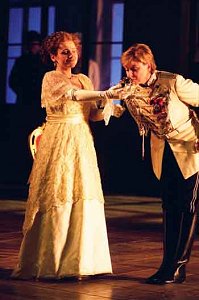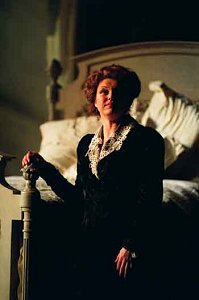S & H Opera Review
Richard Strauss, ‘Der Rosenkavalier’ – English National Opera, 28th February 2003 (ME)
A recent correspondent to The Times complained that the ENO is redundant because it does not restrict itself to operas by English composers (we’ll leave aside the fact that the company was founded, not merely to promote operas written in English, but to make the whole of the operatic repertoire accessible to a wide audience) and he was particularly exercised by the fact such operas as ‘Der Rosenkavalier’ may also be seen at the Royal Opera House – he fails to mention, of course, that a good stalls seat at ENO costs £58.50 whereas the equivalent, supposing Covent Garden were staging the piece, would set you back £160. Fortunately, such views as his are tangential, and 2000 or so people were able to enjoy last night’s superb revival of Jonathan Miller’s production, with a cast which would be hard to better in any opera house, singing in any language.
To begin with the rose-bearer him-or-herself, the rôle was originally to have been taken by the ‘mezzo of the moment’, Alice Coote, but she was replaced by Diana Montague in her first performance of the part on this stage. With its now-customary lack of knowledge in such matters, The Evening Standard informed us three times last week that Ms Montague is ‘a younger generation’ or ‘new generation’ artist – in fact, she has been a professional singer for over 20 years, and is someone with whose voice and person anyone involved in the British opera scene should be very familiar. She has always excelled in such rôles as the Composer and Marcellina, and her recent Magdalene in the ROH ‘Meistersinger’ was one of the best assumptions of the part I have ever heard. Her Octavian did not disappoint; she may be a little mature now, but she still managed to look boyish and to give expression to all the character’s changing moods, and her singing was uniformly beautiful, especially during her final lines in Act I and at the crucial presentation scene – her nobility of phrasing and dignity of bearing here reminded me of Janet Baker.
Her Sophie, Susan Gritton, is almost equally familiar to London audiences (although The Evening Standard appears to think that she, too, is a debutante) and her sweet tone, unaffected acting and air of vulnerability are ideal for the part; she negotiated ‘ein Gruss von Himmel’ and ‘Wie himmlische, nicht irdiche’ with skill, and managed to make Sophie a believable and sympathetic character.Susan Gritton Sophie & Diana Montague Octavian
I found Janice Watson, in her debut as the Marschallin, less sympathetic: her concept of the rôle seems rather aloof, and for once I was not touched at what are usually stirring moments, such as when, to the accompaniment of the throbbing ‘cello notes which so intimately evoke the beating of the heart, she sings the portentous phrase ‘Euer Liebden Kavalier vorfahren mit der Rosen zu der Jungfer Braut’. However, she presents an elegant, thoughtful, credible figure, older than her years, and she sings her monologues with assurance and a forward, creamy tone as well as blending finely with Octavian and Sophie in the trio, which was, appropriately, one of the evening’s highlights.Janice Watson The Feldmarschallin
Hoffmannsthal wrote that Ochs, ‘be he as he may, is still a type of nobleman; he and Faninal complement one another, each need the other, not just in this world but also, so to speak in a metaphysical sense’ and both he and the composer would surely have taken great delight in Miller’s presentation of these two characters, the one so aspirational and his mirror image so self-regarding. John Tomlinson’s Ochs retained the requisite amount of nobility, although he tended to shout when under vocal pressure – he was nevertheless the hit of the evening with the audience. Andrew Shore’s Faninal was a superb assumption, touching in his excitement at the prospect of Octavian’s arrival and actually succeeding in moving us as so few Faninals can at ‘Sind halt aso, die jungen Leut'!’ since we’re usually preoccupied with how the Marschallin is going to take ‘Ja, ja’.
The supporting cast was strong, particularly the grasping Annina of Rebecca de Pont Davies and the ‘Caruso look-alike’ Italian tenor of Barry Banks, who sang ‘Dí rigori armato il seno’ with really succulent tone.
Miller’s production, which sets the opera at around the time of its premiere, is not one of his most original, but it is straightforward, does not strive after too many effects and stages the set pieces with some style. Such little touches as the rain pouring down the windows of the Marschallin’s boudoir and the enormous painting which has just been unpacked in Faninal’s salon do work well, but I was less happy with certain moments where the music seems to say one thing but the director has gone for something else, such as the breakfast scene in Act I where the orchestra so delightfully suggests both the Marschallin and her lover fiddling about with teacups but where in this instance they were at opposite sides of the stage, and, particularly, the closing bars where the music could not be more evocative of little Mohamet brandishing Sophie’s dropped hankie whereas here all we got was one of Ochs’ ‘children’ snatching a cake.
Vassily Sinaisky was the distinguished conductor, and he drew some wonderful playing from the orchestra: this was not a schmaltzy, ‘Viennese’ reading of the score, since textures were sinewy rather than plush and he refused the temptation to overdo the waltzes. I would have liked a little more sense of emotion at moments such as the Marschallin telling her hairdresser that he’s made her look old – I felt this was rather briskly taken, but it was compensated for by the very fine string playing at the end of the first act and the perfect accompaniment to Octavian’s and Sophie’s soaring phrases in Act II.
Another great evening at the Coliseum, another ringing endorsement for this true company which, despite all the prejudices and snobbery of an unsympathetic establishment, in the face of inadequate funding and constant threat to its very existence, continues to live up to its founder’s vision of offering the highest quality performances, sung in English, nurturing British talent and serving as the place where everyone can afford to experience opera.
Melanie Eskenazi
photographer: Bill Rafferty
ENO Revival Production / Der Rosenkavalier / First performance: 28/02/03


 Return to:
Return to: